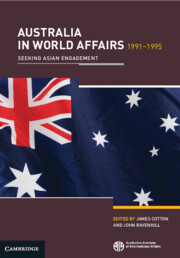Book contents
- Frontmatter
- Contents
- Tables
- Abbreviations
- Contributors
- Preface
- 1 Australia’s ‘Engagement with Asia’
- 2 An Overview
- 3 The Rhetoric of Asia
- 4 Australia and Asia: A View From Europe
- 5 Australia’s Defence Policies in the Post–Cold War Era
- 6 Australia, Disarmament and Arms Control
- 7 Australia and the World Economy 1991–95: Closer Economic Integration with Asia?
- 8 Australia and the International Environment
- 9 Australia and Japan
- 10 Australia and Southeast Asia
- 11 Australia and China, 1991–95: Asymmetry and Congruence in the Post–Cold War Era
- 12 Australia and the Four Asian Dragons: Beyond the Economic Agenda?
- 13 Reassessed: Australia’s Relationship with the United States
- 14 Australia and the European Union
- 15 Australian Relations with the Former Communist States of Europe and the Soviet Union
- 16 Australia and New Zealand: Unequal Partners on the Periphery
- 17 Australia and the South Pacific: The Rationalist Ascendancy
- Notes
- Index
3 - The Rhetoric of Asia
Published online by Cambridge University Press: 04 May 2024
- Frontmatter
- Contents
- Tables
- Abbreviations
- Contributors
- Preface
- 1 Australia’s ‘Engagement with Asia’
- 2 An Overview
- 3 The Rhetoric of Asia
- 4 Australia and Asia: A View From Europe
- 5 Australia’s Defence Policies in the Post–Cold War Era
- 6 Australia, Disarmament and Arms Control
- 7 Australia and the World Economy 1991–95: Closer Economic Integration with Asia?
- 8 Australia and the International Environment
- 9 Australia and Japan
- 10 Australia and Southeast Asia
- 11 Australia and China, 1991–95: Asymmetry and Congruence in the Post–Cold War Era
- 12 Australia and the Four Asian Dragons: Beyond the Economic Agenda?
- 13 Reassessed: Australia’s Relationship with the United States
- 14 Australia and the European Union
- 15 Australian Relations with the Former Communist States of Europe and the Soviet Union
- 16 Australia and New Zealand: Unequal Partners on the Periphery
- 17 Australia and the South Pacific: The Rationalist Ascendancy
- Notes
- Index
Summary
During the early 1990s Australians reviewed their relationship to Asia not only in economic and strategic terms, but also in a broad cultural context. In a sense, Australian identity had always been defined in relation to Asia. The European settlers were aware of their remoteness from the old world and their proximity to people who seemed different to them in exotic and sometimes threatening ways. The ideal of ’White Australia’ had announced a determination to develop an Australian society independently of the new national societies being formed elsewhere in the region. The so-called ’multicultural’ Australia, promoted in the 1970s and 1980s, made claims to be inclusive of non-Western cultures – yet the underpinning ideology was derived from elements of Western liberalism. In the late 1980s and early 1990s, some Australians began to think of their country in different terms again, asking whether it might be possible to consider Australia as in some sense ’Asian’. By 1996, a consensus appeared to emerge to the effect that, although Australians ought to engage vigorously with Asian societies, Australia itself could not convincingly be described as an ’Asian’ country.
Keywords
- Type
- Chapter
- Information
- Australia in World Affairs 1991–1995Seeking Asian Engagement, pp. 23 - 32Publisher: Cambridge University PressFirst published in: 2024

